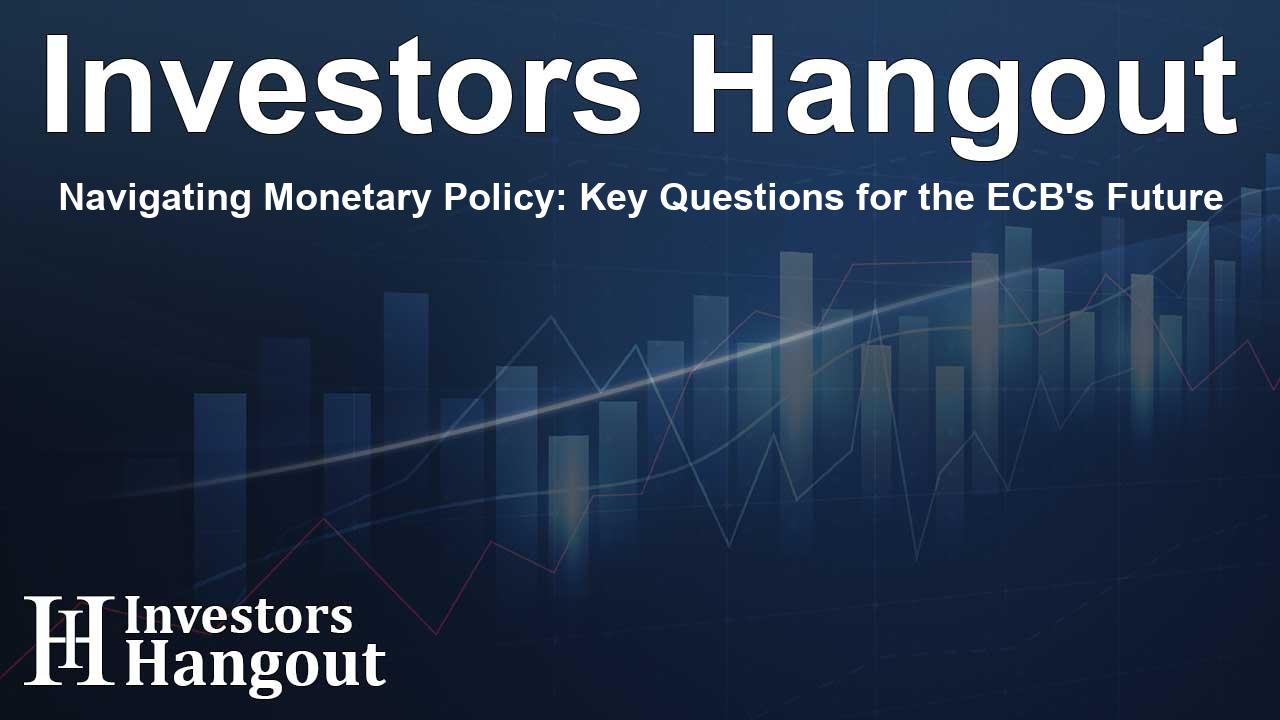Navigating Monetary Policy: Key Questions for the ECB's Future

Understanding the ECB's Path Ahead
The European Central Bank (ECB) faces a significant and imminent decision regarding interest rates, with many anticipating a potential rate cut. The context of this decision is shaped by a juxtaposition of dovish and hawkish views among policymakers. Analysts are eager to interpret what these maneuvers might mean for future monetary policy.
1. What Can We Expect from the ECB's Rate Decision?
It is widely anticipated that the ECB will reduce its deposit rate by 25 basis points. Market players are particularly interested in indications regarding subsequent actions. Since the ECB's last meeting, traders adjusted their expectations considerably, with many now expecting another cut possibly in December, as recent U.S. jobs data have influenced perceptions regarding the Federal Reserve's approach. The outcome of this meeting will not only reflect monetary strategy but also the ECB's stance on upcoming economic data.
2. Is Inflation Still a Concern for the ECB?
As inflation has begun to ease, the current situation presents both challenges and opportunities for the ECB. Recent figures reveal that inflation neared the ECB's 2% target. However, underlying growth remains sluggish, and Germany's economy shrank recently. This situation raises concerns that an overly cautious approach might inadvertently lead to a dip below the target inflation rate. Market analysts suggest that while inflation pressures are easing, the ECB must remain vigilant, particularly given that core inflation and services inflation have not displayed significant declines.
3. How Will ECB Predictions Evolve?
The ECB's projections are due for an update, with many expecting downward revisions in growth forecasts and slight adjustments in core inflation projections. Despite these changes, the ECB is likely to maintain its long-term forecast of returning inflation to the target level by 2025. This outlook reflects a balance between addressing immediate economic concerns and maintaining a consistent strategy for future stability.
4. What Impact Does a Stronger Euro Have?
A stronger euro is not anticipated to have substantial immediate implications for the ECB's monetary policy. While a rising currency could typically contribute to inflation control, research indicates that it would require sustained movements for material effects to be noticed. The euro's momentary strength against the dollar illustrates market dynamics but may not substantially alter the ECB's approach in the short term.
5. What Changes are Imminent in the ECB's Framework?
The ECB's new framework aims to carefully manage liquidity while also addressing the withdrawal of extensive cash levels from the market. Adjustments made to support banks during times of increased cash demand are a response to evolving financial conditions. Nevertheless, the immediate impact of these changes is likely to take years to materialize, given the current levels of excess liquidity in the system. Future releases regarding longer-term loan and bond-buying operations remain critical for market participants to understand how the overall money market structure will evolve.
Frequently Asked Questions
What is the main objective of the ECB's upcoming meeting?
The primary goal is to decide on potential rate cuts, reflecting the bank's response to economic conditions and inflationary pressures.
How does inflation influence the ECB's decisions?
Inflation directly affects the ECB's monetary policy. A persistent inflation rate requires the central bank to consider cuts or other actions to maintain economic stability.
What projections are likely to change in the upcoming update?
Revisions are anticipated in growth forecasts and possibly in core inflation estimates, reflecting the latest economic data.
How does the euro's strength impact inflation?
A stronger euro can help mitigate inflation, but its effects are generally felt only with prolonged movements rather than short-term fluctuations.
What does the new ECB framework entail?
The new framework focuses on liquidity management while offering support to banks, indicating a strategic approach to the evolving financial landscape.
About The Author
Contact Olivia Taylor privately here. Or send an email with ATTN: Olivia Taylor as the subject to contact@investorshangout.com.
About Investors Hangout
Investors Hangout is a leading online stock forum for financial discussion and learning, offering a wide range of free tools and resources. It draws in traders of all levels, who exchange market knowledge, investigate trading tactics, and keep an eye on industry developments in real time. Featuring financial articles, stock message boards, quotes, charts, company profiles, and live news updates. Through cooperative learning and a wealth of informational resources, it helps users from novices creating their first portfolios to experts honing their techniques. Join Investors Hangout today: https://investorshangout.com/
The content of this article is based on factual, publicly available information and does not represent legal, financial, or investment advice. Investors Hangout does not offer financial advice, and the author is not a licensed financial advisor. Consult a qualified advisor before making any financial or investment decisions based on this article. This article should not be considered advice to purchase, sell, or hold any securities or other investments. If any of the material provided here is inaccurate, please contact us for corrections.
